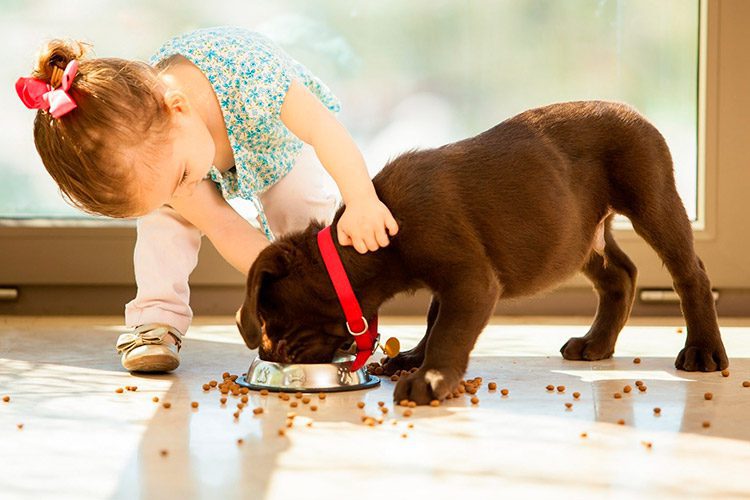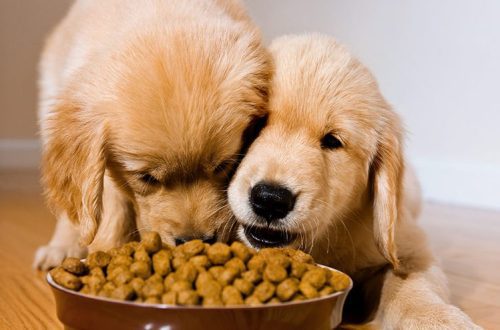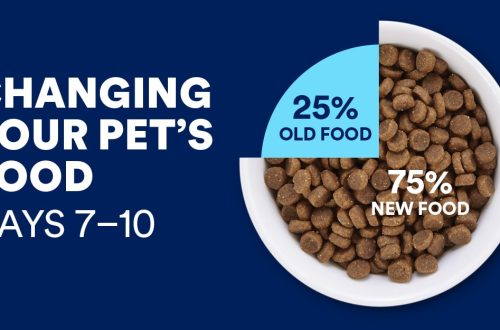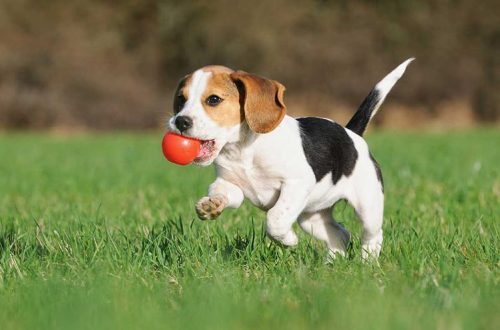
How to feed a puppy: general recommendations
The appearance of a puppy in the house is a joyful, exciting, but at the same time a responsible event for the whole family. Indeed, from the moment you met, the health and well-being of a little fool with a wagging tail depends entirely on you. Do not forget that the puppy is inexperienced and defenseless just like a child. He needs sensitive care, trusts the owner with all his heart, and your main task will be not to deceive the trust of a small creature.
Puppies are like children in many ways. And if the key to the health and harmonious development of a child is high-quality nutritious nutrition, then in the case of dogs everything is exactly the same.
During the first 6 months of life, the puppy is actively developing both mentally and physically. This is a crucial time for the formation of immunity and the whole organism, the period when the foundation is laid for good health of the dog throughout its life.
Developing, the puppy consumes daily 2 times more caloriesthan an adult dog. It is not surprising that he is in dire need of food enriched with vitamins and useful elements. A puppy that is not getting the nutrition it needs will be lethargic, weak and vulnerable to disease. While a properly fed baby always has a great mood, shiny fur, and a lively look. He is active and full of energy, because he needs it so much for new discoveries!
When forming a puppy’s diet, one more feature must be taken into account: From 3 to 6 months of life, the pet’s milk teeth fall out., and they are replaced by strong, healthy teeth of a real predator. During this period, the gums become very sensitive. In addition, the baby may be disturbed by pain. You, as a responsible owner, must help your pet survive this period by adjusting the diet towards softer and more gentle food.
What kind of food to give the puppy (ready-made or natural) is decided by the owner himself. You need to decide in advance on the type of feeding and strictly adhere to it. If you decide to feed your puppy ready-made food, he should not be given food from the table. Conversely, if you feed your baby with self-prepared food, he should not be given ready-made food. And you need to add extra vitamins and minerals to your diet. Choose them together with your veterinarian.
If you have just adopted a puppy, you should continue to feed him the same food that the breeder gave him. Even if you are not completely satisfied with this choice. Moving to a new home is stressful for a baby. No need to burden him with a change in diet. If necessary, you can replace the food, but smoothly and according to all the rules.
Veterinarians recommend feeding your dog a ready-made balanced food of at least super premium class. Гfinished feed – it is very comfortable. With them, you do not need to think about the combination of products and nutrients, as well as spend time cooking.
When choosing ready-made food for a puppy, preference should be given only to trusted manufacturers. Do not save on the health of your pet, guided by a low price.
The best solution would be super premium class feed. They contain all the elements necessary for the proper growth and development of your puppy, in an optimal amount for a growing organism. With high-quality ready-made feeds, you do not have to worry about whether the baby has enough vitamins and minerals, and additionally purchase vitamin and mineral complexes.
If you plan to prepare your own puppy food, the most important thing to consider is that the diet should be balanced and enriched with vitamins and minerals. You will have to pay special attention to the preparation of food for the dog and the balance of ingredients. In addition, the puppy will need an additional vitamin and mineral complex. Food from the table is not suitable in any case.

Proper nutrition is not only high-quality, suitable products, but also a certain mode of eating, and the optimal amount of food. Feed the puppy every day at the same time, adjust the daily number of feedings gradually, depending on the age of the puppy.
An important point: a bowl of water should be freely available for the puppy. But food should be given only during feeding.
If the baby has not finished his portion, 15 minutes after feeding, remove all leftover food from the bowl. If the puppy, on the contrary, quickly eats everything, and then diligently licks the plate and collects the crumbs, most likely, the portion needs to be increased. But you need to do this from the next feeding.
As a rule, puppies under the age of 2 months are fed 6 times a day, from 2 to 4 months. – 5 times, from 4 to 6 months. – 4 times, from 6 to 10 months. – 3 times, after 10 months the dogs are transferred to 2 meals a day.
In terms of serving size, the amount of food depends on the breed, age and activity level of your pet. Do not overfeed the puppy, it will harm his health. It’s better to underfeed your dog a little than overfeed.
If you are using ready-made foods, be sure to consider your puppy’s breed size. In premium and super premium class feeds, it is usually indicated for which breed sizes this or that package is suitable. This division is quite justified, since dogs of different breeds have their own characteristics in feeding.
Dietary variety is good. But do not confuse variety with a combination of natural food and industrial feed.
You can combine ready-made dry and wet food – and it will be very useful for the puppy. But it is impossible to combine industrial feed and products from the refrigerator. Otherwise, there is a high risk of violation of eating habits, imbalance of substances in the body, food intolerance.
If in doubt, consult your veterinarian or an experienced breeder of your breed. It’s better not to take risks with food.
Healthy, balanced treats also help to provide variety in the diet. You will definitely need them for raising a baby and establishing contact with him. The main thing to remember is that a treat is a reward, and not to replace the main meal with them. Stick to the feeding rate indicated on the package.
In our article, we have given general recommendations for feeding puppies, but we should not forget that each breed and each individual dog is individual. Like people, every pet has its own food preferences and needs.
Watch your puppy, learn from veterinarians and breeders, and let your pet grow strong, healthy and beautiful!





